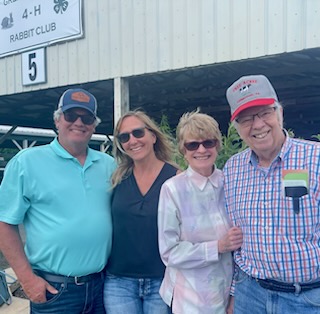Lura Cree, a spry, smiling 80-something remembers the good old days of 1972, when Greene County got its own Pennsylvania Farm Bureau chapter up and running, and she was a young mother on the Cree family dairy farm near Khedive. “We had big meetings in the spring and fall. Sometimes we met in churches, but monthly we met in small groups in our homes. We called ourselves the fertile farmers because many of us were having babies then!”
It’s Sunday, June 9, and we’re in the Goat Barn at the Greene County Fairgrounds, enjoying the Farm Bureau picnic lunch and meeting afterwards, one of those two yearly gatherings used to bring members together. In true farm fashion, the sideboard is loaded with covered dishes and desserts begging to be sampled, and the main course, roasted chicken purchased from the treasury by President Harley Gapen, is individually wrapped in foil—hot, juicy and delicious.
I’m happy to discover there’s a tub of ice holding half-gallon jugs of milk to choose from. I fill my cup and head back to the table to eat with friends and neighbors who have farmed, some for generations, and some because, like me, they love living in wild, wonderful rural Greene County.
If you are part of a farm family tradition, you already know all about what this federation of farmers can do for you and your land to help grow healthy, sustainable crops. But for you, the non-farmer who loves living here—or better yet, is considering growing specialty crops for farmers markets or niche food related product startups like breweries, wineries, food trucks or restaurants—the shared knowledge, political clout and purchasing power that this state organization and national federation offers members is hard to resist.
In 1950, when Pennsylvania farmers decided they needed to “speak with one voice” the Pennsylvania Farm Bureau was legislated into place and became part of American Farm Bureau Federation. This federation is the national voice of farm and ranch families “working together to build a sustainable future of safe and abundant food, fiber and renewable fuel for our nation and the world.”
“We need a working relationship with our legislators,” Gapen told me on the phone before he invited me to the picnic. The other annual meeting in the fall is when they adopt resolutions that will be taken from the grass roots of the counties to the state level at Camp Hill, then nationally to the American Farm Bureau Federation and Congress. This is where advocacy starts, at the grassroots level, where agricultural, environmental and economic factors are reckoned by those who live and work on the land that sustains us all.
“Clean and Green came from Farm Bureau advocacy,” Gapen pointed out. Here at the county level, “We support FFA and the food bank. This year we supplied new gates for the barns here at the fairgrounds. We all work together to help each other out.”
“I joined five years ago. Harley and I are good friends from way, way back,” newly elected Government Relations Director George Scull told me later, as we loaded up to go home. “I’m not really a farmer. My uncle was a dairy farmer. But when Harley told me about the benefits of working bipartisan for the farmer, I was ready to join in about 30 seconds. We need to work with the people in business here to make it sustainable. And we need to help each other and ask what can we do for you? ”
Scull says, “Everything we do here benefits the farmers, the kids, and the community. We need to grow this farm organization because with more members, we have more votes when we take our issues to Camp Hill.”
The Greene County Farm Bureau will be at the Greene County Fair every night dishing out ice cream to hot fairgoers. Make sure to stop by and see them at the fair!
